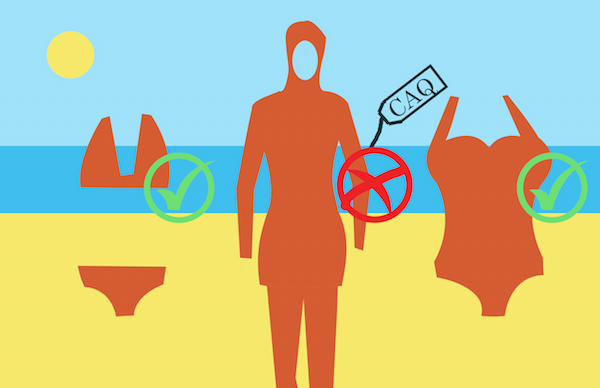This past week, images surfaced from Cannes, France where four armed police officers surrounded an innocent woman on the beach. They forced her to remove her garments amongst a bevy of bystanders and issued her a hefty fine for defying a new ban that prohibits her apparel.
The burkini is a swimsuit that essentially covers the entire body and is worn by Islamic women around the world when swimming or sunbathing. It adheres to their religious beliefs regarding veiling, while also allowing them to enjoy typical aquatic activities, such as going to the beach on a sweltering summer day.
Several French municipalities banned the religious swimwear, with the French Prime Minister saying that the swimsuit symbolizes “the enslavement of women,” according to the CBC. However, this past Friday the ban was overturned by a French high court, ruling that municipalities cannot issue fines, according to another report by the CBC.
Nevertheless, the debate has even spread overseas to Quebec. CAQ MNA Nathalie Roy recently advocated for a province-wide ban of the burkini, and linked the religious garment to radical Islam, according to the CBC. Meanwhile, Parti Quebecois leadership candidate Jean-Francois Lisée said to CTV that the hijab and burkini represent “the ultimate symbol of oppression of women.”
These remarks are reminiscent of Pauline Marois’ mandate back in 2012, when her government tried to introduce the draconian Charter of Quebec Values, which drew upon the dark underbelly of Quebec’s xenophobia. Although the charter was never passed, it stirred up quite the controversy and casted many religious minorities—including Muslim women—to the peripheries of society.
Here at The Concordian, we are absolutely mortified by the conversation amongst Quebec’s political elites, and we fully oppose any ban on religious garments. Since when is it appropriate for the government to tell its citizens how to dress?
It was nearly a century ago that women were subjected to similar harassment from the police in North America, but it was because their swimsuits were too short and revealed too much skin, according to an article published in The Huffington Post. An accompanying photo featured in the article reveals a policeman using measuring tape to see if the length of a woman’s bathing suit is preserving her modesty.
It is preposterous and paradoxical to create a policy that would aim to impose that same kind of control. Furthermore, it is blatantly oppressive and misogynistic to tell women how to dress, in order to meet certain standards, or to better blend into society.
We should all have the right to wear whatever we want, whenever we want—even if it signifies our religious beliefs. The beauty of living in a secular and pluralistic society is that people have the power to determine their own destiny, and we think that wearing the burkini or practicing Islam is a part of that. We should be advocating for tolerance and acceptance, rather than resorting to divisive tactics that drive minority groups further towards the fringes of society.




